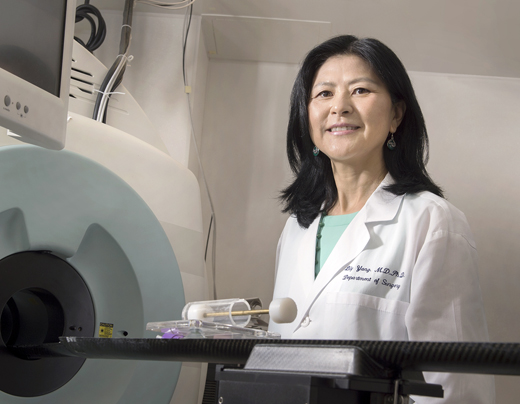The National Cancer Institute (NCI) has awarded a five-year grant to researchers at Winship Cancer Institute of Emory University who are developing nanoparticles to treat pancreatic cancer, one of the most deadly cancers.
The Innovative Research in Cancer Nanotechnology program project grant will support the research team to engineer theranostic magnetic iron oxide nanoparticles for use in nanotechnology enhanced targeted therapy and image guided drug delivery (thera – nostics).
The researchers' primary aim is to overcome a major barrier to treatment in pancreatic cancer – the stroma of pancreatic tumors. Stroma is the connective tissue that supports organs and provides nutrients and regulatory signals to cells, but tumor stroma becomes dense and fibrotic in pancreatic cancer, creating an obstacle to drug delivery and a micro-environment to support the aggressive nature of cancer cells.
Principal investigators for the $2.8 million grant are Lily Yang, MD, PhD, Emory professor of surgery and radiology and the Nancy Panoz Chair of Surgery in Cancer Research, and Hui Mao, PhD, professor of radiology at Emory School of Medicine and biomedical engineering at Emory and Georgia Tech, and head of Emory's functional-molecular imaging and nanotechnology laboratory. Yang is a member of the Cancer Cell Biology Program at Winship, and Mao is a member of Winship's Discovery and Developmental Therapeutics research program.
"Our team plans to create a new generation of "smart" and multifunctional nanoparticle drugs that have the ability to penetrate tumor tissue and break the tumor stroma, overcoming the major challenge of effectively delivering potent drugs for targeted treatment of pancreatic cancer," says Mao.
"Our current research is based on insights from our prior studies, including a more detailed understanding of tumor stroma biology and structure and the development of imaging-capable therapeutic nanoparticles that target particular cellular receptors in tumor stromal cells."
"The development of a stroma-breaking nanoparticle platform could be a game changer in the treatment of pancreatic cancer as well as other stroma-rich cancers," says Yang.
The magnetic iron nanoparticles will be loaded with different types of drug molecules that can be released at the site of the tumor or even inside the tumor cells. The nanoparticles are tracked by magnetic resonance imaging (MRI) to allow visualization of drug delivery sites and treatment responses.
The Emory grant is part of the NCI's Alliance for Nanotechnology in Cancer, which was established in 2004 and is dedicated to changing how cancer is diagnosed, treated and prevented, using nanotechnology solutions. The Emory team led by Yang and Mao is one of only five programs nationally receiving awards from all three funding phases of the alliance, which now includes 15 years of funding.
Other members of the research team include Emory surgical oncology division chief Charles Staley, MD; liver surgery specialist David Kooby, MD; medical oncologist Bassel El-Rayes; and nuclear medicine researcher Malgorzat Lipowska.

